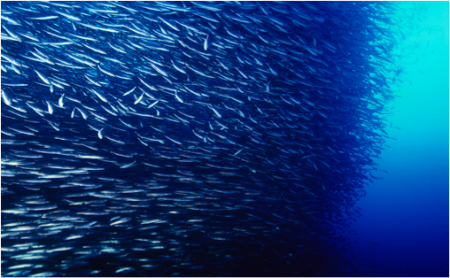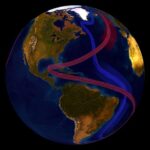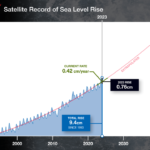May 2, 2015 – A census of fish populations published in Global Change Biology confirms that marine ecosystems in the North Atlantic are being altered by rising ocean temperatures. The warming seas off Europe’s coast are becoming home to species of fish normally seen in more southerly locations. The impact on the marine ecosystem off Northern Europe has altered the mix of species and the distribution of predator and prey in the food chain. The consequences of this altered biodiversity are as of yet unknown.
What the census shows is a literal “sea change” with Baltic and North Seas cold-water species like Atlantic herring and European sprat being replaced by Atlantic Ocean species like mackerel, horse mackerel, anchovy and sardines (pilchards). Many of the new species are larger fish entering an environment previously dominated by smaller ones. And scientists believe the explanation lies in the rise of North Atlantic Ocean temperatures in the last three decades, an increase of 1.3 Celsius (2.34 Fahrenheit) degrees. Correlated with the rise in temperature is the rapid disappearance of sea ice in the Baltic Sea, in the past frozen over much of the winter.
Commercial fishers harvest about 100 million metric tons from the oceans of the world each year. One of the richest has been the North Atlantic fishery. But now it is in steep decline. Evidence abounds whether it is the collapse of cod populations off Canada’s east coast or the disappearance of many ground fish species along continental shelves.
There had to be a reason for this and it appears global warming provides the key. Once the home to herring and sprat, Europe’s coastal waters face an invasion of new species. For the former native fish there is only one place to go – further north. And are they safe there? Only for the moment as the Arctic Ocean experiences longer ice free conditions.
In the April 30th edition of the New York Times it reported a study from the journal, Science, that stated one in six species on this planet will disappear because of global warming. The study cites lots of terrestrial examples but makes little reference to the seas of the world. But when you consider the oceans as the incubator for life on this planet its biodiversity may be even more threatened than that found on continents.
The study, the first comprehensive census of fish species in the North Atlantic, should be followed by many more so that we can begin to understand the depth of the fishery problem we may face in the near future and the implications as a primary food source for Earth’s growing population.

















[…] A rise of 1.3 Celsius has pushed herring and sprat further north with semi-tropical and temperate fish species invading their former niche. […]